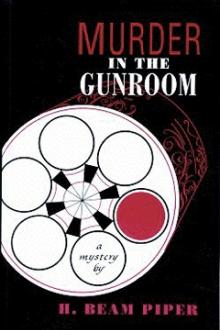Murder in the Gunroom, H. Beam Piper [ebook reader color screen .txt] 📗

- Author: H. Beam Piper
Book online «Murder in the Gunroom, H. Beam Piper [ebook reader color screen .txt] 📗». Author H. Beam Piper
Rand nodded. Any collector—at least, any collector who was a serious arms-student—could do that, particularly if he were a good visualizer and kept his stuff in some systematic order. At the moment, he could have named and described any or all of his own modest collection of two hundred-odd pistols and revolvers.
“I was hoping he’d kept a record,” he said. “A great many collectors do, and it would have helped me quite a bit.” He made up his mind to compile such a record, himself, when he got back to New Belfast. It would be a big help to Carter Tipton, when it came time to settle his own estate, and a man on whom the Reaper has scored as many near-misses as on Jeff Rand should begin to think of such things. “And how about writing materials? And is there a typewriter available?”
There was: a cased portable was on the floor beside the workbench. Walters showed him which desk drawers contained paper and other things. There was, Rand noticed, a loaded .38 Colt Detective Special, in the upper right-hand desk drawer.
“And these phones,” the butler continued, indicating them. “This one is a private outside phone; it doesn’t connect with any other in the house. The other is an extension. It has a buzzer; the outside phone has a regular bell.”
Rand thanked him for the information. Then, picking up a notepad and pencil, he started on the left of the collection, meaning to make a general list and rough approximation of value for use in talking to Gresham’s friends that evening. Tomorrow he would begin on the detailed list for use in soliciting outside offers.
Twenty-five wheel locks: four heavy South German dags, two singles and a pair; three Saxon pistols, with sharply dropped grips, a pair and one single; five French and Italian sixteenth-century pistols; a pair of small pocket or sash pistols; a pair of French petronels, and an extremely long seventeenth-century Dutch pistol with an ivory-covered stock and a carved ivory Venus-head for a pommel; eight seventeenth-century French, Italian and Flemish pistols. Rand noted them down, and was about to pass on; then he looked sharply at one of them.
It was nothing out of the ordinary, as wheel locks go; a long Flemish weapon of about 1640, the type used by the Royalist cavalry in the English Civil War. There were two others almost like it, but this one was in simply appalling condition. The metal was rough with rust, and apparently no attempt had been made to clean it in a couple of centuries. There was a piece cracked out of the fore-end, the ramrod was missing, as was the front ramrod-thimble, both the trigger-guard and the butt-cap were loose, and when Rand touched the wheel, it revolved freely if sluggishly, betraying a broken spring or chain.
The vertical row next to it seemed to be all snaphaunces, but among them Rand saw a pair of Turkish flintlocks. Not even good Turkish flintlocks; a pair of the sort of weapons hastily thrown together by native craftsmen or imported ready-made from Belgium for bazaar sale to gullible tourists. Among the fine examples of seventeenth-century Brescian gunmaking above and below it, these things looked like a pair of Dogpatchers in the Waldorf’s Starlight Room. Rand contemplated them with distaste, then shrugged. After all, they might have had some sentimental significance; say souvenirs of a pleasantly remembered trip to the Levant.
A few rows farther on, among some exceptionally fine flintlocks, all of which predated 1700, he saw one of those big Belgian navy pistols, circa 1800, of the sort once advertised far and wide by a certain old-army-goods dealer for $6.95. This was a particularly repulsive specimen of its breed; grimy with hardened dust and gummed oil, maculated with yellow-surface-rust, the brasswork green with corrosion. It was impossible to shrug off a thing like that. From then on, Rand kept his eyes open for similar incongruities.
They weren’t hard to find. There was a big army pistol, of Central European origin and in abominable condition, among a row of fine multi-shot flintlocks. Multi-shot … Stephen Gresham had mentioned an Elisha Collier flintlock revolver. It wasn’t there. It should be hanging about where this post-Napoleonic German thing was.
There was no Hall breechloader, either, but there was a dilapidated old Ketland. There were many such interlopers among the U.S. Martials: an English ounce-ball cavalry pistol, a French 1777 and a French 1773, a couple more $6.95 bargain-counter specials, a miserable altered S. North 1816. Among the Colts, there was some awful junk, including a big Spanish hinge-frame .44 and a Belgian imitation of a Webley R.I.C. Model. There weren’t as many Paterson Colts as Gresham had spoken of, and the Whitneyville Walker was absent. It went on like that; about a dozen of the best pistols which Rand remembered having seen from two years ago were gone, and he spotted at least twenty items which the late Lane Fleming wouldn’t have hung in his backyard privy, if he’d had one.
Well, that was to be expected. The way these pistols were arranged, the absence of one from its hooks would have been instantly obvious. So, as the good stuff had moved out, these disreputable changelings had moved in.
“You had rather a shocking experience here, in Mr. Fleming’s death,” Rand said, over his shoulder, to the butler.
“Oh, yes indeed, sir!” Walters seemed relieved that





Comments (0)